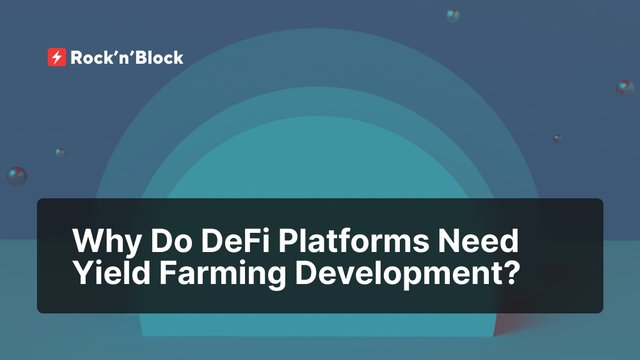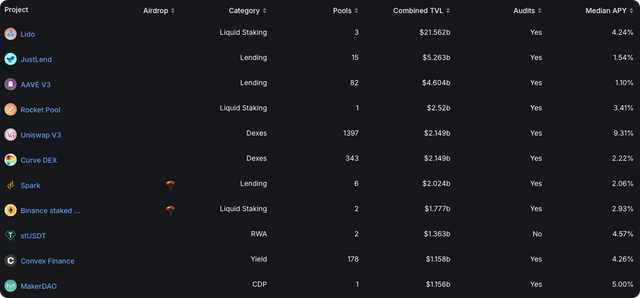This article explores the powerful forces behind DeFi yield farming platform development and why embracing this dynamic frontier is not just a trend, but a strategic imperative for businesses. We will discuss how DeFi yield farming platform development can lead companies to the forefront of financial innovation. Explore the reasons why it is critical for your business to take advantage of the transformative opportunities in decentralized finance.
Defining DeFi Yield Farming Development
DeFi yield farming platform development involves creating and implementing decentralized finance platforms that utilize smart contracts for users to earn rewards, mainly by providing liquidity. These platforms offer enhanced opportunities for capital investment, yield generation, and decentralized finance participation. Entering the DeFi yield farming market grants companies access to a dynamic ecosystem featuring liquidity, decentralized governance, and enticing incentives, transforming traditional finance. With the potential for high returns and the removal of intermediaries, DeFi yield farming development emerges as a disruptive force in modern finance.

🧑🌾 Check out the full article!
Advantages of DeFi Yield Farming for Businesses
Decentralized finance offers businesses numerous strategic advantages through yield farming. This section delves into the unparalleled set of advantages that contribute to the growth, sustainability, and prominence of their decentralized financial ecosystems.
1. Capital Formation and TVL
DeFi yield farming development significantly influences a project's Total Value Locked (TVL), playing a key role in capital formation and growth. TVL, a real-time metric reflecting assets in smart contracts, is boosted by yield farming, encouraging active user participation. Additional rewards and governance rights enhance project transparency. Growing TVL enhances the project's credibility, attracting attention and trust in the crypto community. Increased TVL fosters network effects, creating a self-reinforcing growth cycle. Furthermore, higher TVL indicates risk diversification, strengthening overall ecosystem resilience against market volatility.
Examining the data reveals a compelling insight — the top 10 yield projects are outlined, showcasing their Total Value Locked (TVL) as of February 1, 2024, according to DefiLlama's statistics. This snapshot not only provides a numerical overview but also serves as a visual representation of the substantial impact that DeFi yield farming platform development has had on these projects.

Source: DeFiLlama
In essence, DeFi yield farming platform development acts as one of the catalysts for capital formation, driving TVL growth, and shaping the success and perception of DeFi projects. This dynamic interaction between user participation, incentivization, and TVL underscores the significance of DeFi yield farming platform development in fostering a thriving and resilient decentralized finance ecosystem.
2. Liquidity Incentives
DeFi yield farming platform development is tailored to attract and maintain liquidity in decentralized finance projects. These platforms incentivize users to contribute assets to liquidity pools, creating a robust trading environment.
Bootstrapping New Projects:
For new DeFi projects, the challenge lies in attracting initial liquidity. Yield farming development serves as a catalyst by incentivizing users to lock assets into smart contracts, jumpstarting the liquidity pool and establishing a foundation for smoother trading.
Boosting Existing Protocols:
Even established DeFi protocols benefit from ongoing liquidity incentives. Introducing new yield farming programs or adjusting rewards periodically reignites interest, ensuring protocol competitiveness and adaptability to market changes.
Risk Mitigation:
Increased provider participation enhances overall liquidity, fortifying the ecosystem against sudden shocks. This stability acts as a risk management tool, reducing the likelihood of disruptive events negatively impacting DeFi projects.
3. Attracting and Engaging Users
Incorporating DeFi yield farming platform development has a primary advantage: the ability to attract and engage users. The prospect of earning passive income through yield farming acts as a powerful incentive, drawing users to participate actively in the platform. Projects can create a vibrant and active community by providing users with opportunities to stake and farm tokens.
Incentivized Participation:
DeFi yield farming platforms often reward users with additional tokens or governance rights for staking their LP tokens. This incentive structure encourages users to actively contribute to the platform's liquidity and ecosystem.
Community Building:
Yield farming fosters a sense of community ownership and participation. Users become stakeholders in the success of the project, leading to a more dedicated and involved user base.
Loyalty Programs:
Projects can design loyalty programs within their yield farming mechanisms, offering additional rewards to long-term participants. This not only attracts new users but also retains existing ones, fostering a sustainable user base.
4. Tokenomics and Governance
DeFi yield farming platform development significantly impacts the tokenomics and DeFi yield farming development profoundly shapes the tokenomics and governance of a project, introducing key advantages.
Enhanced Token Utility:
DeFi yield farming transforms tokens into essential tools for participation and value creation. Encouraging users to provide liquidity through yield farming leverages token utility, enhancing market liquidity as tokens are actively used.
Economic Model:
Token issuance strategies intricately tie to a project's economic model. DeFi yield farming development empowers project owners to manage new token release carefully, mitigating inflationary pressures, and ensuring a sustainable token supply.
Yield farming development enables projects to design programs with scheduled reward distributions, aligning with milestones or periods of increased activity. This strategic approach prevents sudden spikes in token supply, ensuring a steady and predictable reward system.
5. Monetization Opportunities
Creating sustainable revenue streams is vital for the enduring success of DeFi projects, and DeFi yield farming platform development offers distinctive monetization opportunities.
Native Token Issuance:
Issuing platform-specific native tokens provides a versatile monetization strategy. These tokens, offering various utilities like governance and additional benefits, contribute to the overall financial health of the platform.
Partnerships and Collaborations:
DeFi yield farming platform development enables strategic partnerships and collaborations within the DeFi space, unlocking additional monetization avenues. Partnering with other projects to create cross-platform yield farming opportunities expands the user base and revenue potential. Integrating with complementary DeFi protocols leverages their user base, enhancing overall platform utility.
Conclusion
DeFi yield farming platform development is not just a technical step, but a strategic move that positions companies as leaders in financial innovation. Yield farming serves as a linchpin for attracting liquidity, fostering community engagement, and enhancing token utility.
As the decentralized finance industry continues to evolve, strategic positioning through innovative platform development becomes a beacon that guides companies to a future defined by disruptive financial solutions.